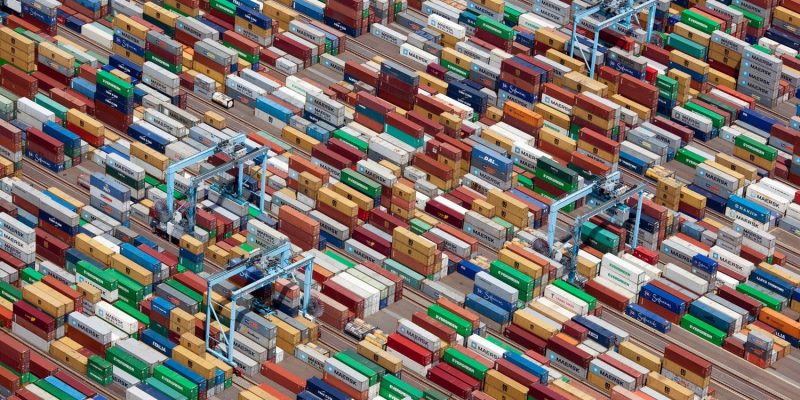After the Manufacturing cost, the shipping cost is usually the second-largest expense when you are manufacturing your product overseas. Most people tend to underestimate the shipping cost, which can lead to a major surprise for those unprepared. Fortunately for you, we’ll breakdown all the costs that you’ll incur when shipping from overseas and importing it into the destination country.
In most cases, a buyer will hire a freight forwarder to handle the shipping on their behalf. Even in this case, there are steps that the buyer must do in order to get the items shipped and cleared by customs and arrive at the final destination. This includes making sure that you know the incoterm, have the products properly packed and labeled,d and have the documentation of the product, such as commercial invoice and more ready.
What is the Cost of Shipping from Asia
When shipping many people think that the freight cost is the only cost in the actual cost of shipping, however in reality that is not the case. In addition to the Fright cost, there are taxes, transport to and from the port, durty, Tariffs (From China to the USA) Customs Bond.
When you are shipping form either China, Vietnam and really anywhere over sear you will need to pay the following:
- Transport from the factory to port
- Export port clearance (exit fees)
- Shipping/freight cost
- Insurance
- Delivery of Documents to customs (UPS, DHL, FedEx)
- Port Charges (aka Destination Charges)
- Custom Bond (USA)
- Tariffs, Duties, and Taxes
- Transport from Domestic port to the final destination
Note that Port is either a shipping port or an airport depending on if you do ocean or air shipping. It’s important that you establish which port it will go through or let a freight forwarder do that for you.
We will go into more depth in the “cost breakdown of shipping a container” later in this post.
What documents do you need to ship:
You can view our Full Guide on what documents are required for Shipping here!
Required Documents of Importing into the USA
- Commercial Invoice listing H.T.S. Code
- Custom Bond
- Custom Broker (almost all freight forwarders will have them on staff)
- Bill of Lading (ISF or HBL)
- Packing list
- Shipment advice
Required Documents for importing to the EU
For shipment to enter the European Union you need
- Packing list
- A Commercial Invoice
- Bill of lading
- Declaration of Conformity
- Shipping advice
Notes about Incoterms
When getting quotes from both your supplier and Freight forwarder, you need to figure out which incoterm to use. This determines when the product is handed off from the factory to you and who is responsible for what steps of the shipping process. You can read the full guide here: https://www.sourcinghub.io/incoterms-2020-guide/
Who does the shipping?
Most buyers usually arrange the shipment through a freight forwarder, and thus do not handle it themselves. Freight forwarders can handle every step of the shipping process, however, they do need some assistance from both the buyer and the seller/manufacturer, mainly in the form of documents and payments. What is a Freight Forwarder? Check out our guide here!
How much does it cost to ship a Container
We used Frightsos free shipping cost estimator and some of the most popular routes, which you can access here; https://ship.freightos.com/search (You will need to make an account)
Important notes: Data was taken on February 16, 2020, for a hypothetical shipment on March 11, 2020. All prices are for a 20’ container, shipped FCL and Port to Port. The prices do NOT include, customs Bond, Taxes, Duties, and inland transportation to and from the port.
Shipping cost from China to the USA
- Shanghai to Los Angeles/Long Beach // $1,200 – $1,400
- Shanghai to New York // $2,200 – $2,500
Shipping cost from China to the EU
- Shanghai to Rotterdam // $850-$1250
- Shanghai to Hamburg // $850 – $1,200
Shipping cost from Vietnam To the USA
- Ho Chi Minh to Los Angeles / Long Beach // $1,175-$1,400
- Ho Chi Minh to New York // $2,225-2,500
Shipping Cost from Vietnam to the EU
- Ho Chi Minh to Rotterdam // $950- $1,250
- Ho Chi Minh to Hamburg // $980 – $1,300
How long does it take to ship a Container
Important note this info is only for Port to Port shipping and does not include times taken to clear the customs and inland transportation from the factory or to final destination.
Shipping Lead time China to the USA
- Shanghai to Los Angeles/Long Beach // 18-28 days
- Shanghai to New York // 30-43 days
Shipping lead time China to the EU
- Shanghai to Rotterdam // 28-43 days
- Shanghai to Hamburg // 30-44 days
Shipping lead time Vietnam To the USA
- Ho Chi Minh to Los Angeles / Long Beach // 20-31 days
- Ho Chi Minh to New York // 27-45 Days
Shipping lead time Vietnam to the EU
- Ho Chi Minh to Rotterdam // 22-35 days
- Ho Chi Minh to Hamburg // 22-35 days
Cost Breakdown of shipping a container
As stated earlier there are several different steps of the shipping process that you are paying for when sending a shipment from a factory to its final destination, usually a warehouse or fulfillment center.
Please note that this guide mainly covers the cost of shipping a full container load (FCL). IF you are looking for Less than container Load (LCL), we cover some differences in the two after this. Despite the difference, most of the cost will be the same, so this section is still useful.
Loading the container and Transportation from Factory to Port
When the manufacturing of your product is finished, a freight forwarder will send a container to the factory. The container is then loaded and shipped to the Port of Loading. In almost all cases the transportation will be land-based, using either a Truck or a train (assuming the factory is near or on a rail yard)
The typical cost for this step is about $100-$500 dollar depending on the distance. Fortunately, most factories are located relatively close to major ports, typically less than 2 hours drive. The cost of transporting from Factory to port is cheaper in China than most other countries, due to China’s investment in world-class infrastructure. In other countries, such as Vietnam and India the cost to transport from Factory to port can be higher than elsewhere due to longer distances traveled and waiting time at the port.
Which party pays the cost depending on which incoterm is chosen. IF you are shipping FOB, which we personally recommend, then the cost is paid for by the factory and the price is reflected in the total price.
Typical cost: $100-$500
Export clearance
Products must be cleared for export from the country in which the goods were manufactured. Rules vary by country but for the most part, you need to have a commercial invoice, a Bill of Lading, and a certificate of origin. My experience is shipping out of China and Vietnam and these were the most common documents. There are a few cases where you need to have a Materials safety sheet if you are shipping a hazardous product.
China’s Customs authority tends to inspect about 5-10% of all shipments that leave the country. We have had inspections done very regularly on shipments. We have been fortunate and all of our products shipped have had the proper documentation and have not been held up. But if you mislabel and the item you can face fines that start at about 10,000 RMB (~$1,400 USD) and go up from there. They also may confiscate and destroy the shipment which they will do at your expense. This is one reason we recommend using an experienced sourcing company that can double-check every step to make sure it’s legit and flows smoothly.
From our experience, it’s best to make sure that the incoterms assign the task to the supplier. It’s much easier for a supplier, who is based in the country of export, to handle this as the process will go much smoother.
Typical Cost: $75-$300 USD
Cost of Freight
The Cost of Fright is simply to cost of shipping from the Port of Loading to the Destination post. For the most part, this is what people think of like shipping, it’s the actual time that the container
Shipping cost varies depending on the destination. It costs about $1,000-6000 to ship a container from China to the United States, depending on the size and which coast. It’s more expensive to ship to the east coast, as ships have to pass through the Panama Canal.
If you are shipping LCL then the shipping cost is most typically charged by volume, not weight, if you are shipping by ocean.
FCL – Varies, but around $1,000 to 6,000
LCL – Varies but around $30-70 a square meter
Insurance cost
Insurance is essential to make sure that you have all the risks covered. most freight forwarding costs include the insurance so it will be a small fee added
The cost of insurance is based on the value of the cargo, and in many cases, it’s valued at 110% of the value of the shipment. The exact amount needs to be negotiated in advance, and typical rates range for 60% of value up to 110%.
The cost tends to be about .2-.4% (note the decimal) of the total value of the shipment as outlined in the commercial invoice. If you are making a shipment of goods worth 100,000 then you should expect to pay between 200-400 in insurance.
Cost of Insurance: .2-.4% of the shipment.
Delivery of documents to destination port
When a shipment is arriving in the domestic port you need to send the documents, inducing Bill of Lading. Packing list, commercial invoice, arrival notice, and other documents. We detailed the documents needed above. These documents are usually shipped with standard posts, such as DHL, UPS or FedEx, in advance of the cargo. You can send original or certified copies.
Cost: around $50
Destination/ arrival port charges
This is the step in which the customs, taxes, duties, and tariffs are applied
This step is usually the biggest surprise for those who have never shipped before. The main reason is that the final cost is hard to quote in advance and is determined by the customs office at the time that the item arrives in the port. Customs charges vary widely depending on the classification so it’s important that you do your homework in advance.
IF you want to calculate your charges the first thing you will need to know is your items HTS (Harmonized Tariff Schedule) code, and then look up the charges in advance and calculate them based on the commercial invoice provided by your supplier. Cosmo sourcing wrote a guide on how to find out the rates in advance here: Guide to Tariffs and Customs Duty // How to Easily Import your Product
Another hidden cost is inspection charges. In the US, Canada, and the EU tend to inspect about 5-10% of cargo entering the country. These inspections range from a quick visual inspection or an X-Ray that can take a few hours and cost $100-300 to a full inspection that can take up to a week and cost $2000. Unfortunately, when this happens, the buyer is expected to pay the cost.
It’s hard to give an exact rate but you should expect to pay about 2-8% of the value of the shipment for taxes and duties, and if you are shipping a good into the US from China that is hit by tariffs then add an extra 10-25% on top of that.
United States Customs Bond
IF you are importing into the United States then you need to obtain a Customs bond. This only applies to the US, so you can skip this section if you are shipping elsewhere.
What is a Customs Bond?
A customs bond is basically a contract or legal agreement that ensures that the Importer pays all required fees, duties and taxes to customs. This is often called an Import bond. Customs and border protection (CBP) make this standard for all shipments of more than $2,500 or are restricted by other agencies such as the FDA.
Most customs brokers as well as online booking platforms such as FreightOS or Flexport, allow you to purchase them directly with them.
There are two types of Custom bond, single entry or a continuous bond. A single entry bond is good for those who only are doing one shipment or isn’t sure about the future. The cost is 5.5% per $1000 and a minimum cost of $55. A continuous bond is useful for anyone who does regular shipment and is valid for an unlimited amount of entries. The rate starts at $475 a year.
Cost: varies by shipment, roughly 5.5%
Transport from Destination port to Final destination
This is the final cost associated with shipping. This is the cost to get your product from the port to the final destination. This is typically done by either truck or by train.
In the United States, If you are shipping by Truck, you should expect to pay about $1.50-3.00 per mile to ship a container. Train rates are much cheaper. European Union is hard to get consistent answers as it varies by country.
Cost: Varies by distance, type of transport, and country
Shipping Cost Overview
| Shipping Steps | Shipping Cost (USD) |
| Loading the container and Transportation from Factory to Port | $100-$500 |
| Export clearance | $75-$300 |
| Cost of Fright | $1,500 to 6,000 |
| Insurance cost | .2-.4% of the shipment. |
| Delivery of documents to destination port | around $50 |
| Destination/ arrival port charges | Varies widely |
| Customs Bond (United States) | Roughly 5.5% |
| Transport from Destination port to Final destination | $100-$500+ |
Final Thoughts
Shipping can be complex, which is why you need to be prepared to make sure that it goes as smoothly as possible. Even if you use a freight forwarder, which we highly recommend, you will still need to know the shipping cost in advance so that you do not have any surprises. There are also several documents that you and your supplier need to prepare so that you can get it cleared.
Most importantly you need to know what the shipping cost is well in advance. Many people will actually get quotes for shipping BEFORE they start manufacturing so that you can get the total landed cost of the product so that you can anticipate risk as much as possible.
We hope you found this guide useful, leave a comment with any questions you may have




